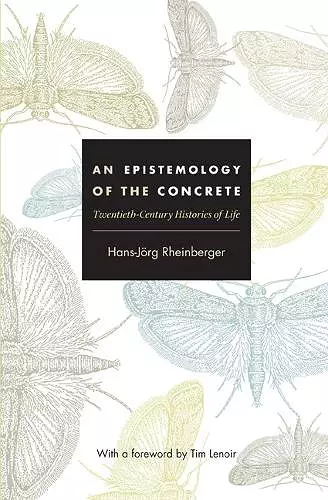An Epistemology of the Concrete
Twentieth-Century Histories of Life
Format:Hardback
Publisher:Duke University Press
Published:6th Sep '10
Currently unavailable, and unfortunately no date known when it will be back

An exploration of 20th century scientific discourse, focusing on experimental models in genetics and microbiology
Brings together case studies and theoretical reflections on the history and epistemology of the life sciences by Hans-Jörg Rheinberger, one of the foremost philosophers of science.An Epistemology of the Concrete brings together case studies and theoretical reflections on the history and epistemology of the life sciences by Hans-Jörg Rheinberger, one of the world’s foremost philosophers of science. In these essays, he examines the history of experiments, concepts, model organisms, instruments, and the gamut of epistemological, institutional, political, and social factors that determine the actual course of the development of knowledge. Building on ideas from his influential book Toward a History of Epistemic Things, Rheinberger first considers ways of historicizing scientific knowledge, and then explores different configurations of genetic experimentation in the first half of the twentieth century and the interaction between apparatuses, experiments, and concept formation in molecular biology in the second half of the twentieth century. He delves into fundamental epistemological issues bearing on the relationship between instruments and objects of knowledge, laboratory preparations as a special class of epistemic objects, and the note-taking and write-up techniques used in research labs. He takes up topics ranging from the French “historical epistemologists” Gaston Bachelard and Georges Canguilhem to the liquid scintillation counter, a radioactivity measuring device that became a crucial tool for molecular biology and biomedicine in the 1960s and 1970s. Throughout An Epistemology of the Concrete, Rheinberger shows how assemblages—historical conjunctures—set the conditions for the emergence of epistemic novelty, and he conveys the fascination of scientific things: those organisms, spaces, apparatuses, and techniques that are transformed by research and that transform research in turn.
“Readers will find that the overarching theme of the text is that scientific knowledge is not simply the result of a series of advances in which one pays forward into the next like a row of falling dominos. It is an emergent property of a nonlinear process involving a complex interplay of history, culture, and the scientific process. Rheinberger’s case studies present science as a productive enterprise with measurable outcomes such as conceptual models, experimental organisms, and instrumentation. . . . Highly recommended. Upper-division undergraduates and above.” - J. A. Hewlett, Choice
“An Epistemology of the Concrete offers a methodological framework and a set of research exemplars that will shape science studies for years to come.”—Tim Lenoir, from the foreword
“In this empirical and conceptual tour de force, Hans-Jörg Rheinberger provides an examination of the work of key twentieth-century epistemologists, rigorous historical vignettes of model-organism research, a materialist epistemology of experimental biology, and, consequently, a carefully precise yet broadly illuminating theorization of modes of knowledge production. An Epistemology of the Concrete is a major contribution not only to the history of science but also to fields such as anthropology, which are turning to epistemological analyses of the life sciences as a key site of inquiry.”—Kaushik Sunder Rajan, author of Biocapital: The Constitution of Postgenomic Life
“Hans-Jörg Rheinberger has played a prominent role in bringing those strands of thinking together, thus pioneering an integrated approach to the history and the philosophy of science and, most importantly, illuminating several long-standing philosophical debates with profound, creative and scientifically informed insights on the nature of experimental work. Within this wonderful volume, Rheinberger uses his understanding of the history of biology and his experience as a practising experimenter to build a sophisticated epistemology of scientific practice.” -- Sabina Leonelli * International Studies in the Philosophy of Science *
“The reader will learn a great deal from Rheinberger’s essays on the scholars whom he sees as crucial in order to conceive of scientific knowledge as inherently historical, social, and ‘concrete’. The reader will also find an answer to what is historical epistemology today, or at least one version of it, both in theoretical terms and through case studies that show how a historical epistemological perspective enables the epistemologist, historian, and sociologist to read scientific activity.” -- Christina Chimisso * Radical Philosophy *
“Readers will find that the overarching theme of the text is that scientific knowledge is not simply the result of a series of advances in which one pays forward into the next like a row of falling dominos. It is an emergent property of a nonlinear process involving a complex interplay of history, culture, and the scientific process. Rheinberger’s case studies present science as a productive enterprise with measurable outcomes such as conceptual models, experimental organisms, and instrumentation. . . . Highly recommended. Upper-division undergraduates and above.” -- J. A. Hewlett * Choice *
ISBN: 9780822345602
Dimensions: unknown
Weight: 621g
352 pages